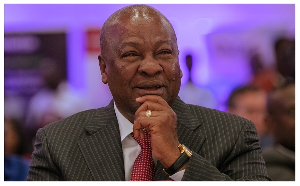- Home - News
- TWI News | TV
- Polls
- Year In Review
- News Archive
- Crime & Punishment
- Politics
- Regional
- Editorial
- Health
- Ghanaians Abroad
- Tabloid
- Africa
- Religion
- Election 2020
- Coronavirus
- News Videos | TV
- Photo Archives
- News Headlines
- Press Release
- News Blogs
Business News of Friday, 21 June 2024
Source: thebftonline.com
Localise start-up classifications to spur growth in indigenous initiatives
President-Ghana Association of Start-ups, Solomon Adjei, has urged the domestication of startup classifications to enhance startups’ growth and sustainability in the country.
According to Mr. Adjei, streamlining start-up classifications to fit Ghana’s unique economic and cultural context is essential for building the capacity of startups. “This approach will nurture innovation and resilience among indigenous entrepreneurs, supporting the burgeoning startup ecosystem.”
He argued that this should be considered as a part of broader indigenous initiatives aimed at stimulating growth within the local startup environment, and in the long run also enable businesses to thrive in the global marketplace.
“We need a framework that reflects our local realities and leverages our strengths,” Adjei stated. “This will not only aid in the sustainable development of startups but also contribute significantly to the country’s broader economic growth.”
The Ghana Association of Startups president was speaking in an interview on the sidelines of a ‘Matchmaking and Technology Transfer Workshop’ in Koforidua, and contended that “we need to understand that startups are not just any company starting”.
He emphasised the importance of understanding startups’ various phases based on global standards to connect them with appropriate funding and support mechanisms. “We need to put deliberate measures in place to ensure we build the capacity of startups from the base,” he added.
The ‘Matchmaking and Technology Transfer Workshop’ was organised by the Ministry of Environment, Science, Technology and innovation (MESTI), in collaboration with the Commission for Technical and Vocational Education and Training (CTVET).
The programme aimed to facilitate identifying technologies that can help scale up business ventures. It is a key initiative under the Ghana Jobs and Skills Project and aims to bridge the gap between research institutions and industry, enabling entrepreneurs to leverage cutting-edge technologies to create new industries or scale existing ones.
While commending efforts by MESTI and other collaborators for bringing local startups together to explore opportunities presented by academia and industry, Mr. Adjei expressed hope that the engagement will be replicated across the country.
The Ghana Jobs and Skills Project is a five-year programme funded by the World Bank, aimed at supporting skills development and job creation across the country.
Its components include providing apprenticeship training for at least 25,000 individuals, entrepreneurship and small enterprise support for at least 50,000 individuals, operationalisation of the Ghana Labour Market Information System, upgrading district public employment centres and independent performance reviews of government youth employment and skills development programmes.
The project’s beneficiaries include individuals seeking skills and jobs, master craftpersons and associations, private enterprises and their workforces, and public and private training providers.
Implementing institutions for the project include the Commission for Technical and Vocational Education and Training (CTVET), Ministry of Employment and Labour Relations (MELR), MESTI and Ghana Enterprises Agency (GEA).
Deputy Director-ST&I at MESTI, Nashiru Salifu, also speaking in an interview, described the local startup ecosystem as being in an activation phase – adding that efforts are being made to put together a bill for startups and innovation in the country.
To this end, he said, MESTI continues working with other ministries, state agencies and academic institutions to mobilise all the key actors, together, to explore how they can collaborate with each other in advancing the country’s entrepreneurship ecosystem.
Project Coordinator for the Ghana Jobs and Skills Project at the Ministry of Finance, Mr. Franklin Ashiadey, noted that the programme seeks to particularly address youth unemployment in the country.
He said the grant offered to startups is expected to boost their capacity to also employ others, and by extension enhance job creation across the country.











